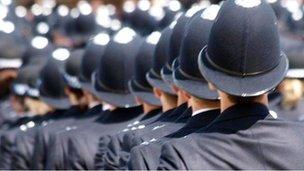Police commissioner election leaflets posted
- Published

There are fears the elections will see a low turnout from the public
Leaflets about the police and crime commissioner elections have begun to be sent to 21 million households.
Voters in all parts of England and Wales outside London will elect a person to oversee each police force on 15 November.
The new commissioners will replace police authorities in 41 areas.
The Electoral Commission leaflets explain more about the role and the voting system being used, amid concerns of a low turnout from voters.
The commission says households should receive their leaflets by the end of the week.
The police and crime commissioners, who will be paid a salary between £65,000 and £100,000, will agree budgets, set strategic priorities and recruit or dismiss chief constables.
Local police authorities made up of councillors currently have these powers.
The commissioners will not take decisions on day-to-day police operations.
The candidate lists have been published for 39 of the 41 police areas holding the elections.
The remaining two - Avon and Somerset, and Gloucestershire - will publish on Tuesday.
The figures so far show:
186 candidates in total are standing in the 39 areas that have published so far
28% of candidates are independent
Labour and the Conservatives are running candidates in every area, while the Liberal Democrats are running candidates in 22 of the 39 areas which have released details
17% of candidates are women (32 out of 186)
UKIP are running 24 candidates in the 39 areas
one Green candidate is standing
Boycott call
On Sunday, former Metropolitan Police chief Lord Ian Blair said people should boycott the elections in a bid to stop the proposal.
He said each commissioner would have to control too large an area.
But Home Secretary Theresa May said the commissioners would, for the first time, have a democratic mandate over police.
And she said that contrary to some reports, the candidate manifestos were not just available online, but also in print if people requested them in that format.
The Home Office has launched a media campaign to attract interest in the elections amid concerns about a possible low turnout by the public.
The Electoral Reform Society predicted turnout will be as low as 18.5% - compared with 65% in the 2010 general election.
Its chief executive, Katie Ghose, has warned the elections were in danger of "turning into a farce".